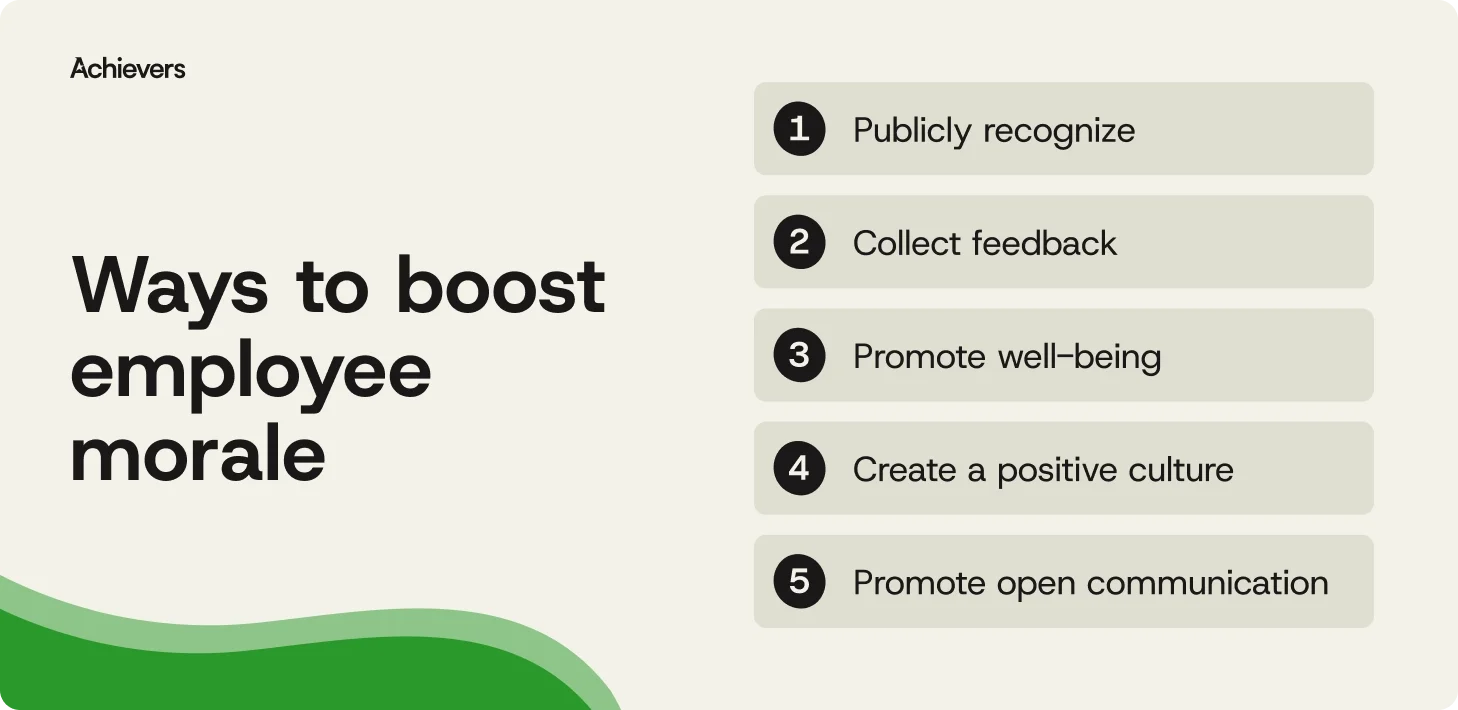Table of contents
Create a culture that means business™
Schedule a demo with an Achievers solution expert today.
To boost employee morale, you’ll need more than a kombucha tap and a few kudos in Slack.
Morale runs deeper — it’s how people feel about their work, their team, and whether any of it really matters. And it matters a lot. Gallup found that when engagement gets the attention it deserves, productivity jumps by 18% and profitability climbs by 23%. One of the most effective — and underused — ways to get there? Recognition. Not the once-a-year kind, but real, timely appreciation that reminds people their effort actually means something.
In this blog, we’re breaking down 15 practical, people-first ways to boost employee morale — the kind that go beyond quick fixes and make a lasting impact.
Top 15 ways to boost employee morale
Looking to raise spirits and keep your teams genuinely engaged? Start with these first five morale boosters — no trust falls required.

1. Publicly recognize and appreciate
Not just once a quarter. Not just from managers. Recognition should be frequent, meaningful, and built into the way your team works. But right now, the 2025 State of Recognition Report tells us that 53% of employees are recognized only a few times a year or less. It’s time to change that. Here’s how:
- Launch a points-based program so employees can recognize and reward peers on the spot
- Make shoutouts part of the everyday workflow with integrations like MS Teams, Slack, or Outlook.
- Use a public feed to highlight recognition moments company-wide, and boost visibility across teams
- Set a goal for managers to recognize their teams weekly (and hold them to it with reporting)
2. Collect feedback regularly
Asking for input and doing nothing with it? That’s a morale killer. Acting on it is what builds trust across teams.
- Use monthly surveys to catch issues before they snowball
- Offer anonymous, always-on channels for feedback, not just formal review cycles
- Share a “You said, we did” update after each survey to close the loop
- Tie feedback to the company’s core values so you can track how culture shows up across the organization
3. Promote well-being and work-life balance
When people are stretched too thin or burned out, morale takes a hit fast. Show employees their health matters by building well-being into your culture and your benefits.
- Offer mental health support, including counseling, apps, or wellness stipends
- Encourage flexible work hours and time off that people actually feel safe using
- Add well-being options to your rewards marketplace — from fitness classes to mindfulness memberships
- Train managers to recognize burnout and create space for recovery
4. Create a positive and inclusive workplace culture
Your culture isn’t what’s written on your careers page — it’s what people live every day. When employees feel aligned with your values and supported by leadership, morale and motivation go hand in hand.
- Hold leaders accountable for modeling your company values
- Recognize and reward behaviors that reflect your culture
- Foster psychological safety by encouraging open dialogue and embracing diverse perspectives
- Create spaces — digital or physical — where people can connect meaningfully across teams
5. Promote open communication and connection
When communication breaks down, morale follows. Strong relationships and transparent communication are essential to keeping morale high and keeping teams aligned.
- Host regular team check-ins that go beyond status updates — include wins, shoutouts, and space to connect
- Use recognition to keep remote employees visible and included
- Share company updates in plain language, not corporate-speak, and encourage honest dialogue
- Give managers the tools to communicate with empathy and clarity, especially during change
6. Encourage professional development
Want employees to stick around and stay engaged? Show them they have a future with you. Career growth isn’t just about promotions — it’s about learning, stretch opportunities, and knowing that their skills matter.
- Offer a mix of formal learning programs and on-the-job development
- Recognize when employees take initiative or level up their skills
- Promote from within whenever possible — and make the path visible
- Pair recognition with learning milestones to reinforce growth
7. Tie outcomes to purpose
Morale soars when people feel their work actually matters. Help employees connect their day-to-day contributions to the bigger picture — and recognize the impact they’re making along the way.
- Highlight how individual work ties to team or company goals
- Celebrate outcomes, not just effort
- Use recognition to reinforce values-based behaviors
- Share real stories of customer or community impact that employees helped create
8. Empower managers to boost morale
People don’t leave companies — they leave managers. The right leadership can make or break morale. Equip your managers to lead with empathy, clarity, and consistency.
- Train managers to give feedback that motivates, not discourages
- Set recognition goals at the manager level and track follow-through
- Give managers tools to spot disengagement early and respond effectively
- Recognize great managers publicly, and let others learn from them
9. Encourage autonomy and trust
Micromanagement is a morale killer. Trust your people to do their jobs — and give them the flexibility to do it in a way that works best for them.
- Focus on outcomes, not hours or keystrokes
- Offer flexible scheduling and hybrid options where possible
- Recognize employees for taking ownership and driving results
- Involve employees in decisions that affect their work — it builds buy-in and trust
10. Celebrate achievements and milestones
Every milestone matters. Recognizing achievements, whether it’s a huge product launch or a small process improvement, keeps motivation high and progress visible.
- Create a culture of regular celebration, not just end-of-year awards
- Shout out small wins during standups or all-hands meetings
- Use a recognition platform to scale celebration across teams and time zones
- Align celebrations with values to reinforce what success looks like
11. Encourage peer-to-peer appreciation
Top-down recognition is great — but it shouldn’t be the only kind. When employees celebrate each other, it strengthens relationships and builds a culture where appreciation is everyone’s job.
- Launch peer recognition campaigns to spotlight unsung heroes
- Add boosts, comments, and reactions to recognition moments to encourage visibility
- Highlight peer-nominated shoutouts in company-wide communications
- Tie peer recognition back to your company values to reinforce cultural alignment
12. Foster diversity, equity, inclusion, and belonging
People can’t feel great at work if they don’t feel safe, seen, or supported. DEIB isn’t a checkbox — it’s a core driver of morale, trust, and engagement.
- Build inclusive recognition options that reflect diverse employee needs and preferences
- Create ERGs and support them with real resources — not just lip service
- Use recognition data to uncover gaps in visibility and inclusion
- Make sure every employee has equal access to reward and recognition opportunities
13. Align recognition with your values
Recognition means more when it’s tied to something bigger. By linking appreciation to your company’s values, you help employees understand what good work looks like — and what it looks like to live your culture.
- Define clear recognition criteria based on core values
- Share examples of value-aligned behaviors in action
- Use custom badges or awards to celebrate specific behaviors or cultural contributions
- Make values-based recognition part of onboarding and manager training
14. Celebrate career milestones and life moments
Tenure matters — but so does everything that leads up to it. Celebrating moments across the employee lifecycle shows people that their journey is valued at every step.
- Recognize work anniversaries with meaningful, personalized rewards
- Mark promotions, certifications, and project completions with public appreciation
- Offer redemption experiences that reflect different life stages and career goals
- Let employees choose how they want to celebrate — one size doesn’t fit all
15. Host team-building activities
Team morale doesn’t just come from hitting KPIs. It also comes from connection. Shared experiences help build trust, spark creativity, and bring a little joy to the workday.
- Organize inclusive social events, team outings, or virtual game breaks
- Rotate ownership — let employees plan and lead experiences they’re excited about
- Use milestones as a reason to bring people together, whether it’s a lunch, a quiz, or a creative challenge
- Keep it optional, low-pressure, and authentic; the best moments are the ones that feel natural
Employee morale in action: Wesley’s recognition success story
Wesley, a purpose-driven non-profit, knew that improving employee morale meant going beyond good intentions. They needed a consistent, values-aligned way to recognize and reward their people. So, Wesley partnered with Achievers to launch “Inspire” — a social recognition platform built to celebrate the everyday wins and big moments that matter most.
With Inspire, employees could give and receive recognition in real time, nominate peers for monthly awards, and earn points toward meaningful, personalized rewards. The goal? Build a culture where appreciation is visible, frequent, and tied directly to Wesley’s mission.
The results speak for themselves:
- +18 point increase in Employee Net Promoter Score (eNPS)
- +19 point lift in overall engagement
By making recognition part of the daily experience, Wesley turned appreciation into a morale-boosting strategy that delivered measurable impact.
Recognize more. Boost morale. Move the needle.
Let’s face it, morale doesn’t rise just because you added a ping-pong table or updated the dress code. If you want to boost employee morale in a way that lasts, start with what works: recognition that’s frequent, meaningful, and built into the everyday.
That’s where Achievers comes in.
With more than 2x the recognition frequency of any other provider — and up to 5x the impact on key business drivers — Achievers helps organizations turn values into behaviors and behaviors into real results. We’re talking higher engagement, better retention, and teams that don’t just show up, but show up energized.
If you’re ready to boost employee morale without the gimmicks, it’s time to recognize with Achievers.



